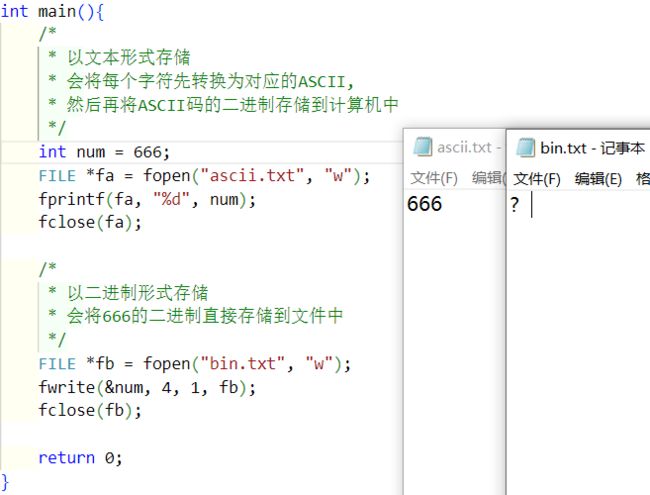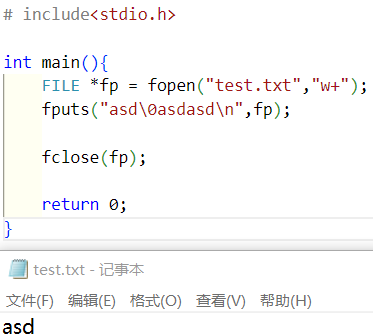C语言——文件
C语言目录:
1. 概述
2. 数据类型
3. 量
4. 运算符
5. 流程控制
6. 函数
7. C程序编译过程
8. 文件
9. 内存管理
文件流:C语言将文件看做一个字符序列,即文件是由若干字符组成的字符流
8.1 文件分类
8.1.1 文本文件
文件内容以ASCII码格式存放,一个字节存放一个ASCII码,代表一个字符 ,但占用存储空间较多
.c 文件就是以文本文件形式存放的
8.1.2 二进制文件
文件内容以补码格式存放,占用存储空间少。
数据按其内存中的存储形式原样存放
.exe 文件就是以二进制文件形式存放
8.1.3 示例
#include - 记事本默认按照ASCII码逐个解码文件,由于文本文件存储的是ASCII码,所以可以正常解析
- 记事本按照ASCII码解码文件,所以解析出来是乱码
8.2 文件的操作
FILE 结构体
C语言中存放文件属性的结构体(缓冲区和文件读写状态),所有的文件操作都是通过
FILE结构体完成的,只能通过指针访问属性
struct _iobuf {
char *_ptr; //文件输入的下一个位置
int _cnt; //当前缓冲区的相对位置
char *_base; //文件的起始位置)
int _flag; //文件标志
int _file; //文件的有效性验证
int _charbuf; //检查缓冲区状况,如果无缓冲区则不读取
int _bufsiz; // 缓冲区大小
char *_tmpfname; //临时文件名
};
typedef struct _iobuf FILE;
8.2.1 打开文件
建立程序和文件之间的通信通道,并为文件系统建立缓冲
所在文件:stdio.h
a. 参数及返回值
FILE *fopen(const char *filename,const char *mode);
//以mode的方式,打开filename命名的文件,返回一个指向该文件缓冲的FILE结构体指针
FILE *fp = fopen("路径","w");
| 参数/返回值 | 含义 |
|---|---|
char *filename |
要打开或者创建文件的路径 |
mode |
打开文件的方式 |
FILE |
返回指向文件缓冲区的指针,用于操作文件 |
b. 文件读写方式
| mode | 文件类型 | 操作 | 文件不存在 | 文件存在 |
|---|---|---|---|---|
| r | 文本文件 | 读取 | 出错 | 打开文件 |
| w | 文本文件 | 写入 | 创建新文件 | 覆盖原文件 |
| a | 文本文件 | 追加 | 创建新文件 | 原文件后追加 |
| r+ | 文本文件 | 读取/写入 | 出错 | 打开文件 |
| w+ | 文本文件 | 读取/写入 | 创建新文件 | 覆盖原文件 |
| a+ | 文本文件 | 读取/追加 | 创建新文件 | 原文件后追加 |
| rb | 二进制文件 | 读取 | 出错 | 打开文件 |
| wb | 二进制文件 | 写入 | 创建新文件 | 覆盖原文件 |
| ab | 二进制文件 | 追加 | 创建新文件 | 原文件后追加 |
| rb+ | 二进制文件 | 读取/写入 | 出错 | 打开文件 |
| wb+ | 二进制文件 | 读取/写入 | 创建新文件 | 覆盖原文件 |
| ab+ | 二进制文件 | 读取/追加 | 创建新文件 | 原文件后追加 |
8.2.2 关闭文件
所在文件:stdio.h
函数功能:fclose() 用来关闭之前 fopen() 打开的文件
函数操作:让缓冲区内的数据写入文件,并释放系统提供的文件资源
a. 参数和返回值
int fclose(FILE *filePointer)
| 参数/返回值 | 含义 |
|---|---|
| FILE *filePointe | 指向文件缓冲的指针 |
| int | 成功则返回0,失败则返回EOF(-1) |
int main(){
FILE *fp;
if(fopen("abc.txt","w")==NULL){
exit(-1);//非0表示异常
}
fclose(fp);
}
8.2.3 读写文件
需要引入
位置指针:打开文件,默认指向文件开头
- 所有文件读/写,都是从
位置指针指示的位置进行读/写
分为
- 顺序读写
- 随机读写
a. 文本文件读写
文件尾测试函数
文件使用特殊字符
EOF作为文件结束标记
int feof(FILE *stream); :判断是否读到文件结尾
- 0表示未读到文件尾
- 非0表示读到文件尾,此时不能读取文件
所在文件:stdio.h
参数:FILE *stream 是指向文件缓冲的指针
注意:文件只有读了才会修改 位置指针 ,没有打开并读取的文件无法通过 feof(fp) 判断是否读到文件尾,一定要 先读在判断
# include在使用 feof() 判断文件尾时,最后一行没有 \n 会少读一行
#include 读/写一个字符
| 读入一个字符 | 输出一个字符 | 所在文件 |
|---|---|---|
getchar() |
putchar() |
stdio.h |
fgetc(fp) |
fputc(ch,fp) |
stdio.h |
int fgetc(FILE *fp):从文件中读取一个字符,若到文件尾返回EOF
- 正常情况返回一个int类型值
- 读到文件尾或出错,返回
EOF
#include int fputc(int ch,FILE *fp):将ch字符写入文件
- 写入成功,返回写入的字符
- 写入失败,返回
EOF
# include读/写一行字符串
| 读入字符串 | 输出字符串 | 所在文件 |
|---|---|---|
getchar() |
putchar() |
stdio.h |
fgets(fp) |
fputs(s,fp) |
stdio.h |
char *fgets(char *s,int n,FILE *fp) :从 fp 指向的文件中读取 n-1 个字符,写入s中;如果中间遇到 \0 或者 EOF ,读入结束,且在字符串最后添加 \0
- 正常,返回
char *str指针 - 遇到
\n或EOF则停止读取 - 出错,返回空指针
NULL
#include #include int fputs(char *s,FILE *fp) :将 s 中的字符串写到 fp 指向的文件中
- 正常则返回0
- 出错则返回
EOF
# include遇到 \0 自动终止写入
# include格式读/写
int fscanf(FILE *fp,char *format)
读/写成功返回整数
int fprintf(FILE *fp,char *fprmat)
b. 二进制文件读/写
二进制文件的读写函数可以读取文本文件
文本文件的读写函数不可读取二进制文件
unsigned fread(void *ptr,unsigned size,unsigned n,FILE *fp)
从文件
fp中读取n个size字节的数据块,存储于ptr指向的内存空间
- 成功,则返回
n - 出错或文件结束,则返回0
#include 注意:读取时,size 取最小字节,n 可以随便写
-
若读取时
size不是最小字节,则会引起读取失败如存储的
char类型 0A 1E 1C 2C 66 67 68size = 1时,n=1024,会将文件中内容依次取出size = 4时,n=1024,第一个数据块 0A 1E 1C 2C 会顺利取出,但最后剩下3个字节不足一个数据块,则最后一个块读取不到
unsigned fwrite(void *ptr,unsigned size,unsigned n,FILE *fp)
将
ptr指向的存储空间的n个size字节的数据块写入文件fp中
- 成功,则返回
n - 出错或文件结束,则返回0
# include读写数组
# include读写结构体
结构体中的数据类型不统一,此时最适合用二进制的方式进行读写
单个结构体
# include读写结构体数组
# include8.2.4 文件操作函数
a. 获取文件位置指针
long ftell(FILE *fp) :返回距文件头的字节数
- 成功,则返回整型
- 失败,返回-1
#include b. 位置指针重定位
void rewind() :使位置指针指向文件头
c. 文件定位函数
int fseek(FILE *fp, long offset, int origin ); : 将位置指针移动到指定位置
-
fp:文件的指针,指向要操作的文件 -
offset:表示要移动的字节数offset 为正时,向后移动;
offset 为负时,向前移动
-
origin:从何处开始计算偏移量。起始点 常量名 常量值 文件开头 SEEK_SET 0 当前位置 SEEK_CUR 1 文件末尾 SEEK_END 2
#include #include 

